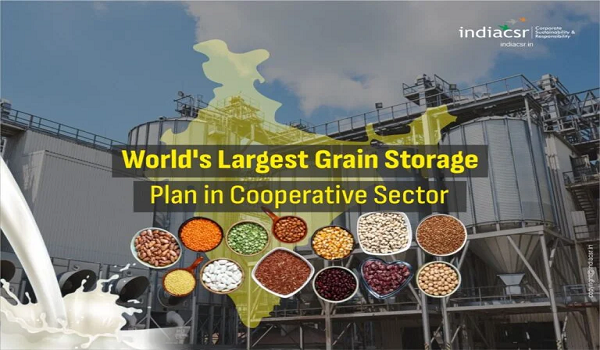The ambitious pilot project for decentralized grain storage, a key initiative under the world’s largest grain storage plan in the cooperative sector, has marked a significant milestone.
Constructed with the support of the National Cooperative Development Corporation (NCDC), National Bank for Agriculture and Rural Development (NABARD), and its consultancy arm, NABCONS, godowns at Primary Agricultural Credit Societies (PACS) level have been successfully established in 11 states. These states include Maharashtra, Uttar Pradesh, Tamil Nadu, Karnataka, Gujarat, Madhya Pradesh, Uttarakhand, Assam, Telangana, Tripura, and Rajasthan.
Objectives of the Programme
This initiative aims to:
- Enhance decentralized grain storage capacity at the grassroots level.
- Improve food security by reducing wastage during storage and ensuring availability in rural areas.
- Empower PACS to act as hubs for agricultural and rural development activities.
Key Features of the Pilot Project
- Infrastructure Development: Each PACS godown is equipped to store grains securely, ensuring quality and minimizing losses due to pests or climatic factors.
- Cold Chain Establishments: PACS are also being equipped to establish cold chain infrastructure, including:
- Cold storage units for perishables.
- Pack houses for sorting and packaging.
- Refrigeration vans for transporting fruits and vegetables.
- This cold chain infrastructure is aligned with the Centrally Sponsored Scheme of Mission for Integrated Development of Horticulture (MIDH), enabling efficient distribution of fresh produce from rural areas to markets.
Expansion and Future Prospects
- Following the initial success, the pilot project has been extended, with over 500 additional PACS identified as of November 21, 2024. These PACS, spread across the country, will replicate the decentralized storage model, significantly scaling up storage capacity and enhancing food security.
- The involvement of cooperative societies ensures greater participation by farmers and local communities, fostering ownership and sustainability.
Impact and Benefits
- Enhanced Storage Capacity: Mitigates storage issues for farmers, providing better options for grain preservation.
- Reduction in Post-Harvest Losses: Improved infrastructure minimizes losses due to spoilage, pests, and poor storage conditions.
- Boost to Rural Economy: Strengthened PACS contribute to job creation and improve the economic conditions of rural populations.
- Efficient Supply Chain for Horticulture: Cold chain facilities help maintain the freshness and quality of fruits and vegetables, ensuring better market prices for farmers and reducing waste.
Collaborative Effort
The success of this project reflects the collaborative efforts of central and state governments, financial institutions, and cooperative societies. With entities like NABARD and NCDC providing financial and technical assistance, the program showcases how cooperative models can effectively address critical issues in agriculture and food security.
Way Forward
As the program expands, its long-term vision includes:
- Establishing a robust nationwide decentralized storage network.
- Integrating advanced technology for inventory management and monitoring.
- Strengthening supply chains for agricultural produce, benefiting both farmers and consumers.
This decentralized approach represents a major leap forward in achieving food security, fostering rural development, and empowering India’s agricultural sector through the cooperative model.


